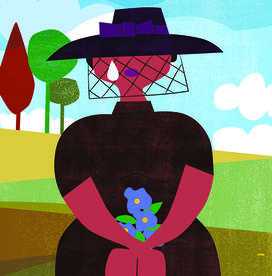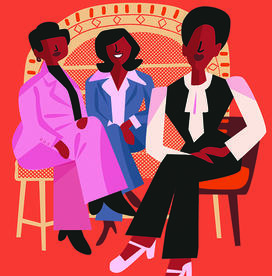Rhaisa Williams Is Investigating Black Motherhood

Assistant professor of theater Rhaisa Williams has always been fascinated by stories about people. She has a doctorate in performance studies — a field that is “all about the different ways that the rituals, the cultures, the systems, the institutions make us who we are,” she says. Williams finds stories are the way to get at both the mundane and hugely gigantic — and the narratives that drive her research are the stories of Black women.
Much of her research involves going into archives and studying stories and photographs to look for the richness and complexity of Black women’s lives in the past.
“How can we complicate different types of responses for Black women,” Williams asks, when they’re dealing with various types of suffering?
She might start with a newspaper story and intertwine it with information from court cases or a school newsletter to create a larger record. She wants to bring all these threads together to enrich the ways Black women are portrayed.
Williams’ Work: A Sampling

Controversial Contracts
Williams is working on her first book, which will be published sometime in 2025, tentatively called Mama, Don’t You Weep: Black Motherhood Performances and the Economics of Grief. Interested in the ways that contracts play an outsize role in how Black women have been able to fight for and prevent issues from happening to them and their children, she conceptualizes Black maternal grief from the fraught history of economics, affect, and juridical petitioning to highlight how contracts — from life insurance policies to working agreements — frame grief. Informed by the legacy of slavery, she adds, contracts form the invisible backbone of how Black women can publicly articulate grief and attempt to obtain material support for their families.

Maternal Grief, Exposed
Much of Williams’ work is inspired by her family history. In one article published in the journal Transforming Anthropology called “Toward a Theorization of Black Maternal Grief as Analytic,” she focuses on her paternal grandmother’s death. She explores the archetype of the strong Black mother who becomes an emotional force and bedrock for everyone around her, and also looks at how grief about a family member’s death can bring vulnerability, complexity, and softness into life experiences. “How can we complicate different types of responses for Black women,” she asks, when they’re dealing with various types of suffering? She hopes to widen the lens on the ways that Black mothers deal with traumatic loss, in all its forms.

Mothers & Nightlife
In a recent essay about Black matrilineage and photography, Williams examines a picture of her mother, grandmother, and great-aunt seated regally on a makeshift stage with a velvet backdrop. The focus is to think more critically about similar images taken at cabaret parties and after-hour joints throughout Cleveland, Ohio, during the 1970s and 1980s. Doing so reveals “webs of labor, work, pleasure, joy, process, and rituals that Black mothers existed within,” she says. It also showcases the pictorial interconnectedness of families, extended communities, and Black folks during particular generations. She hopes to expand the article into a narrative book.











No responses yet